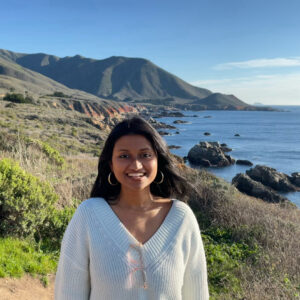Graduate Profile: Somreeta Paul

Somreeta Paul is a 3rd year Philosophy Graduate Student at UC Santa Cruz. She is a summer 2024 THI Graduate Public Fellow with the Philosophy Learning and Teaching Organization (PLATO), a part of a global UNESCO network that encourages children to participate in philosophical inquiry. Paul has also worked with the UCSC Center for Public Philosophy. Additionally, she was a part of THI’s Graduate Student Success program (GSS), where she was involved with workshops, mentorship opportunities, and cohort-building activities. Over the summer, we sat down with Somreeta to discuss her experience as a Public Fellow with PLATO and GSS.
Hi Somreeta! Thanks for chatting with us about your ongoing research. To begin, could you give us a general synopsis of your dissertation and talk about your work with the Center for Public Philosophy (CPP)?
Thank you for giving me this moment to talk about my research and my work with the Center for Public Philosophy! At present, I am working on moral psychology and imagination, especially how our biases influence our imagination and how biased imagination further influences our beliefs and actions.
A lot of my work focuses on understanding how the mind operates in a social setting, especially our belief system, perception, and cognition ridden with normative biases such as racism, sexism, anti-culturalism, etc. I have been involved with the Centre of Public Philosophy (CPP) at UCSC for the past three years, where I have been the mentor, coach, moderator, and judge of several Ethics Bowls. I have given talks on the ethics of AI and social psychology as part of the ‘Night of Ideas’ and ‘Crossing Borders,’ two public events organized by CPP and others, where we engaged with people not only outside the discipline but also outside academia. I have also been part of the ‘Ask a Philosopher’ booth, where we directly talk with the public about any philosophical questions they want to engage with. From my experience, I have realized how much everyday life can contribute to theoretical concepts and how academia should not be aloof by virtue of its intellectual superiority.
You work as a THI Summer Public Fellow with PLATO, Philosophy Learning and Teaching Organization. Can you share what drew you to this position and what you’ve spent the majority of your time working on?
Nurturing critical thinking and moral reasoning from an early age is essential not only for academic accomplishments but also for a good life for oneself and society at large.
PLATO is an organization that works with children, forming creative and interactive lesson plans, workshops, ethics bowls, etc. My field of work drives me to look at individual mindsets and how biases and prejudice influence people’s beliefs, cognition, and emotions. This is what made me keen on working for them because it would allow me to garner my interest in the developmental basis of cognitive bias among children by connecting with them. I spent the majority of my time creating lesson plans on philosophy for K-12 children, especially inculcating metaphysical, ethical, and epistemological discussions and activities for children, which will be used by educators around US schools. I worked with wonderful people and have received valuable feedback on how some important ideas are entertained or rejected and how I can make these ideas more acceptable and desirable for children. Nurturing critical thinking and moral reasoning from an early age is essential not only for academic accomplishments but also for a good life for oneself and society at large. I believe philosophical thinking has the potential to bring this kind of awareness.
What skills have you been building during your THI Public Fellowship at PLATO? What will you carry forward with you from the experience?
I have learned how to talk about deep theoretical questions in undemanding and interactive ways so that even children can understand and engage.
Although I have worked with middle school and high school students for the Ethics Bowl before PLATO, I have never been involved with any work related to Philosophy for Children. I have always been fascinated with how children ask meaningful questions, which we often mistakenly deem innocent but can be quite critical. I feel like it is our responsibility as adults to nurture these thoughts at this early age. So, working for PLATO has been a ‘Sophie’s World’ moment for me! I have learned how to talk about deep theoretical questions in undemanding and interactive ways so that even children can understand and engage. This has been a valuable experience because I look forward to bringing this into play in the future when I teach undergrads.
It is wonderful that you’ve also connected with THI in other ways, including joining PhD+ workshops and the Graduate Student Success program. Is there anything you’d like to share about how this has supported you as a PhD student? Why do you think these types of resources are important for graduate students?
The Graduate Student Success program was especially helpful, because I was in my first year in an entirely foreign country with no idea where to begin. It introduced me to a lot of programs including the PHD+ workshops, other graduate students to talk to, provided a space to share our concerns and questions in every meeting, provided mentors, and many more. I attended many PhD+ workshops, but the one on Burnout management and the one on website/cv development really stood out to me. I think these types of resources are exceptionally helpful, especially to create awareness that there is support available for graduate students if need arises. Also, very importantly, these resources have been wonderful in learning what grants and fellowships are available for students.
Fun Question: When you aren’t on campus, where is your favorite place to go in Santa Cruz County?
I think that would be Davenport. It usually is never crowded and the sunset is absolutely breathtaking! There are also hiking trails that I often enjoy around Henry Cowell Redwoods State Park and Wilder Ranch.
